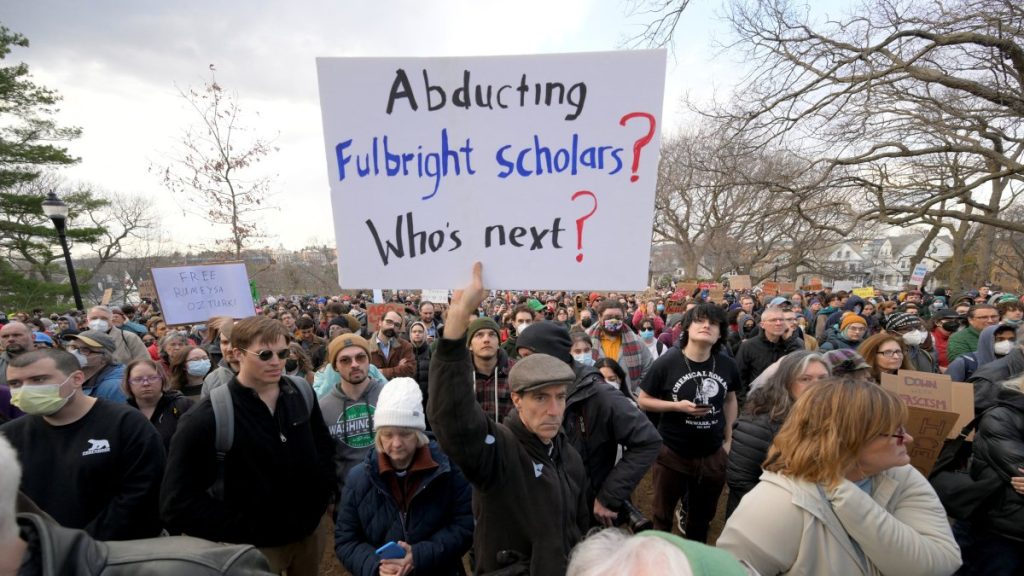In his address to the United States Congress last year, Israeli Prime Minister Benjamin Netanyahu referred to the university students who had been protesting against Israel’s genocide in Gaza as “Iran’s useful idiots.” The accusation received a standing ovation from the members, as anyone would have expected at that point. Back then, opposing Israel’s barbarism meant this: That one would have been aiding Iran, presumably by simply caring about justice and accountability.
Today, if one were to care about justice and accountability and express this sentiment by publishing a piece in a university paper calling for the implementation of international law, the consequences would be far more dire. The recent abduction of Rümeysa Öztürk, a Turkish doctoral student at Tufts University, by masked officers in broad daylight shows that labeling dissenting voices “Iran’s useful idiots” no longer suffices to please the top genocidaire.
And how do academics, who love imagining themselves as “dissident intellectuals” when convenient, react to the increasing suppression of student protests? With absolute subservience to their patrons, of course. In fact, some of them would probably behave in the same way for free, as they have historically been determined to do “effective and decisive work on behalf of the war.” These types are certainly not so foolish as to show any sign of hesitation, like Harvard University’s former president, Claudine Gay, or Columbia University’s former president, Minouche Shafik, did, in upholding “liberal values.”
These values, one must recall, include freedom of expression – so long as that expression aligns neatly with the tastes of defense contractors, hedge fund managers or the Silicon Valley “philanthropists.” They include academic freedom, but only insofar as it is exercised within the acceptable parameters defined by alumni donors and board members with government clearance. Then there is the cherished commitment to diversity and inclusion, which apparently collapses the moment someone mentions the genocide in Gaza without first issuing a comprehensive disclaimer, apology and a footnote acknowledging “the right of Israel to exist” in every dimension imaginable.
The result is a campus environment that simulates intellectual rigor while functioning, in practice, as a tightly policed marketplace of curated opinion. One cannot help but notice how quickly departments that once issued dramatic statements on racial justice or gender equity retreat into stunned silence when asked to comment on the systematic slaughter of a civilian population, as though moral courage was a limited resource best conserved for “safer causes.”
Indeed, the contemporary academic has revealed themselves to be little more than a careerist with a citation index. In the face of arrests, surveillance and the deliberate silencing of dissident voices, these “intellectuals” react not with outrage, but with procedural memos, committee discussions and the occasional op-ed urging “nuance.” Many of them are far too clever to put their names on anything that could cost them a fellowship or consultancy. Others, more ambitious still, sense that true upward mobility in today’s academy lies not in speaking the truth, but in managing the discomforts of power with the correct vocabulary, which doubtless requires great skill.
The most impressive among them are those who have mastered the art of symbolic resistance: They will hang a keffiyeh in their office, quote Edward Said from time to time, and perhaps even sign a carefully worded petition, before returning to grant applications funded by the same entities that profit from death and destruction around the world. This is really the true face of liberal academia: not a battleground of ideas, but a managed zone of containment, so to speak, where moral urgency is domesticated, redirected and, when necessary, disappears. The disappearance of Rümeysa Öztürk is not just a scandal that lays bare the lie of freedom of expression in the U.S. – it is a reminder that in liberal academia, silence is not mere complicity, but really policy.


